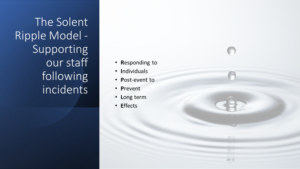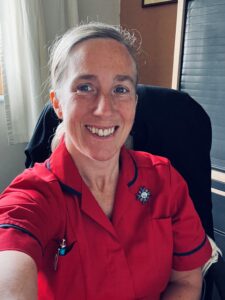This week’s Blog is written by Pauline Jeffrey (@PaulineJeffrey5), Head of Quality and Safety at Solent NHS Trust and Gina Winter-Bates (@Winterbate1Gina), Associate Nurse Director Quality and Safety at Solent NHS Trust and a @FNightingaleF scholar.
Background to developing the RIPPLE model
Being involved in an incident or event at work could lead to sickness/absence as a direct response if the individual involved is not supported adequately. When considering emotional first aid in his TED talk, Guy Winch discusses psychological injuries and states that “they can get worse if we ignore them and they can impact our lives in dramatic ways”.
The NHS Sickness Absence Rates, October 2021 to December 2021, Provisional Statistics report published on 28th April 2022, reports that “anxiety/stress/depression/other psychiatric illnesses is consistently the most reported reason for sickness absence, accounting for over 593,200 full time equivalent days lost and 23.7% of all sickness absence in December 2021” (NHS Digital, 2022). This is consistently the highest reported reason for sickness in the NHS. The 2020 NHS annual staff survey showed that 44% of staff felt unwell as a result of work-related stress during the previous 12 months (NHS Staff Survey, 2020). It is fair to say that not all of this will be related to incidents and events, but their impact surely does reflect in the figures. Incidents and events, although appearing small and insignificant are like throwing stones in a pond – they ripple outwards and the more stones that are thrown, the bigger the collective impact.
“In October 2020 I was involved in a traumatic incident at work. As a nurse of many years, several of which were in acute and emergency medicine, dealing with challenging situations was not new to me. However, this felt very different. We had been working remotely from home due to the covid-19 pandemic and contact with my peers was limited. The event was a shock and impacted on several professionals.
Initial support for staff was informal and provided, by ourselves, for each other. There were tears, there was talking, and there was a shared experience of shock and distress. After several weeks we were offered a more formal approach to psychological support and I experienced my first formal debrief session. This was an opportunity for the team to come together, tell our story and reflect on the impact it had had on us all, individually, and collectively. I found this enormously helpful in my recovery from the event.”
In January 2021 a change in role and organisation led me to become involved in the management of incidents and understanding the support available to staff across the organisation.
I began to recognise the impact that being involved in an event at work can have on staff members. The Covid-19 pandemic has added additional challenges which may have reduced the resilience of our staff. Support was often offered to staff who had been involved in an incident but it occurred to me that staff were not always aware of how to access it and as a team we did not always know where to signpost to. This led me to explore what was on offer to staff to access if they needed to.
What I did next?
I held a workshop at the Trust’s Quality Improvement and Risk Group, which is our main forum for discussions about safety, to understand current support available for staff following events. This established that a wide range of supportive measures are available, but these were inconsistent across the Trust and staff awareness was variable. The group suggested an approach where some responsibility for supporting staff remained locally within the service lines, but a centrally coordinated function could support staff to be aware of and access all support available. In response to this, I developed a model for all staff to be able to access relevant support following events, if required. This is a suite of available options pulled together into a model, recognising that the impact of events on individuals differs widely. What is felt to be traumatic to one person may not feel traumatic to another.
An “event” could be any of the following:
- Being involved in an incident
- Managing a challenging complaint
- Representing the Trust in court
- Safeguarding Adults or Children
- Colleague accident/death
- Another event which has impact on a team or individual
Accessing any of the options is not mandatory but should be available to all staff and offered at any point post event. It is recognised that initial, informal debrief is often ideally peer led which is reflected in the model. It would, in essence be bespoke for the team or person involved.
The support available does not replace formal supervision or reflective practice sessions which are regularly undertaken by registrants. This model represents a range of support which is available to all staff to provide required support following an event which could have long term impact on them.
This model does not replace the existing support available from our valuable resources in the Occupational Health Team and the Safeguarding Team but provides an opportunity for all staff to be signposted to the appropriate place for support.
I consulted with colleagues across the Trust to establish the range of support options already available to staff and identified two further areas for development:
- Facilitated Peer Support – this had been provided to two teams and received a positive response. I felt able to provide a facilitator for these sessions from my team on an ad hoc basis acknowledging that additional facilitators may be required if sessions are needed frequently.
- We were able to add a function to our reporting system which provided a box to be ticked if the reporter feels that additional support is required for the team. This flags to my team that contact with the reporter is required. This will enable early identification of staff needing support and will also be able to provide additional data on the volume of incidents requiring additional staff support.
The Ripple Model
The model is based on the ripple effect of the event and the psychological impact over a period of time. The word RIPPLE stands for Responding to Individuals Post-event to Prevent Long term Effects. The drop hitting the water symbolises the event and the ripples symbolise stages in time as follows:
Stage 1 – Event
Stage 2 – Immediate actions – within 48 hours
Stage 3 – Within72 hours
Stage 4 – Within 2 weeks
Stage 5 – Within 3 months
Stage 1-5 and beyond – From the event up to and beyond 3 months
Written guidance was also provided as an appendix for facilitation of initial debriefing following incidents.
Looking forward
The impact that we hope to see this from approach is that staff report that they were supported and were able to access or were signposted to the appropriate and timely level of support. This impact will be measured using a variety of sources including data from the reporting system, staff survey results and qualitative feedback from staff accessing support.
We have begun the roll out of this model and so far, a range of teams have sought support, from all areas across the trust and for different reasons. This co-ordinated approach will complement other support mechanisms and ensure signposting is there. It is hoped that in this small way we can identify the ‘stones’ in the pond that are events for our teams and stop the ripples earlier in the day.

